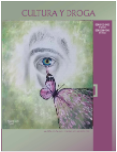Autores/as
Resumen
Objetivo. Evaluar el estado de la investigación actual sobre el potencial terapéutico de las sustancias psicodélicas. Metodología. Se realiza una breve revisión temática y se desarrolla un análisis crítico de la situación. Resultados. Se identifican diversas limitaciones y sesgos tanto en estudios observacionales como en ensayos clínicos. Conclusiones. Actualmente se cometen errores remarcables en la investigación sobre terapia psicodélica que pueden llevar a confusiones sobre aspectos tan importantes como su eficacia y su seguridad en contextos terapéuticos.
Palabras clave
Citas
Bratman, G.N., Hamilton, J.P. and Daily, G.C. (2012). The impacts of nature experience on human cognitive function and mental health. Ann NY AcadSci, 1249, 118-136.
Cushman, M., Kuller, L.H., Prentice, R. et al. (2004). Estrogen plus progestin and risk of venous thrombosis. JAMA, 292 (13), 1573-80.
Dawson, S.L., Dash, S.R., and Jacka, F.N. (2016). The importance of diet and gut health to the treatment and prevention of mental disorders. Int Rev Neurobiol, 131, 325-46.
European Medicines Agency (EMA). (2012). Guideline on clinical investigation of medicinal products, including depot preparations in the treatment of schizophrenia. Recuperado de: http://www.ema.europa.eu/docs/en_GB/document_library/Scientific_guideline/2012/10/WC500133437.pdf
Frank, J. (1982). Therapeutic Components Shared by all Psychotherapies. En: J. Harvey y M. Parks (Eds.). Psychotherapy Research and Behavior Change. Washington: APA.
Gasser, P., Holstein, D., Michel, Y., Doblin, R., Yazar-Klosinski, B., Passie, T. and Brenneisen, R. (2014). Safety and efficacy of lysergic acid diethylamide-assisted psychotherapy for anxiety associated with life-threatening diseases. J NervMent Dis, 202 (7), 513-20.
Griffiths, R.R., Johnson, M.W., Carducci, M.A., Umbricht, A., Richards, W.A., Richards, B.D. et al. (2016). Psilocybin produces substantial and sustained decreases in depression and anxiety in patients with life-threatening cancer: a randomized double-blind trial. J Psychopharmacol, 30, 1181-1197.
Grob, C.S., Danforth, A.L., Chopra, G.S., Hagerty, M., McKay, C.R., Halberstadt, A.L. and Greer, G.R. (2011). Pilot study of psilocybin treatment for anxiety in patients with advanced-stage cancer. Arch Gen Psychiatry, 68 (1), 71-8.
Grodstein, F., Manson, J.E., Colditz, G.A., Willett, W.C., Speizer, F.E. and Stampfer, M.J. (2000). A prospective, observational study of postmenopausal hormone therapy and primary prevention of cardiovascular disease. Ann InternMed, 133 (12), 933-41.
Hofmann, A. (2018). Epílogo. En J.C. Bouso (Ed.). LSD. Cómo descubrí el ácido y qué pasó después en el mundo (p. 286). Barcelona: Arpa Editores.
Jacka, F.N., O’Neil, A., Opie, R., Itsiopoulos, C., Cotton, S., Mohebbi, M., and Berk, M. (2017). A randomised controlled trial of dietary improvement for adults with major depression (the `SMILES’ trial). BMC Medicine, 15 (1), 23.
Lambert, M.J. (1986). Implications on psychotherapy outcome research for eclectic psychotherapy. In J.C. Norcross (Ed.). Handbook of Eclectic Psychotherapy. New York: Brunner-Mazel.
Laporte, J.R. (1993). Extrapolación de los resultados de ensayos clínicos a la práctica clínica habitual. En: Principios Básicos de Investigación Clínica. Madrid, Ergon Eds., España.
Luborsky, L., Mintz, J. and Chirstoph, P. (1979). Are psychotherapeutic changes predictable? Journal of Consulting and Clinical Psychology, 47 (3), 469-473.
MacNair, R. and Corazzini, J. (1994). Client factors influencing group therapy dropout. Psychotherapy, 31 (2), 352-362.
Malcolm, B.J., Polanco, M. and Barsuglia, J.P. (2018). Changes in withdrawal and craving scores in participants undergoing opioid detoxification utilizing ibogaine. Journal of Psychoactive Drugs. doi: 10.1080/02791072.2018.1447175.
Mithoefer, M.C., Wagner, M.T., Mithoefer, A.T., Jerome, L., and Doblin, R. (2011). The safety and efficacy of {+/-}3,4-methylenedioxymethamphetamine-assisted psychotherapy in subjects with chronic, treatment-resistant posttraumatic stress disorder: the first
randomized controlled pilot study. J Psychopharmacol, 25 (4), 439-52.
Nichols, D.E. (2016). Psychedelics. PharmacolRev, 68 (2), 264-355. Observatorio Español de la Droga y las Toxicomanías. INFORME 2017. Situación y tendencias de los problemas de drogas en España. Plan Nacional Sobre Drogas.
Oehen, P., Traber, R., Widmer, V. and Schnyder, U. (2013). A randomized, controlled pilot study of MDMA (± 3,4-Methylenedioxymethamphetamine)-assisted psychotherapy for treatment of resistant, chronic Post-Traumatic Stress Disorder (PTSD). J Psychopharmacol, 27 (1), 40-52.
Ona, G. (2017). Las drogas psicodélicas en las fronteras del conocimiento humano. Recuperado de https://goo.gl/zn5MMv.
Ona, G. (2018). Modelo biomédico en salud mental: un paradigma a superar. Recuperado de https://goo.gl/xi3XaJ.
Orlinsky, D., Grawe, K. and Parks, K. (1994). Process and outcome in psychotherapy. En: L. Bergin y L. Garfield (Eds.). Handbook of psychotherapy and behavior change (pp. 270-376). Nueva York: John Wiley and Sons.
Palhano-Fontes, F., Barreto, D., Onias, H., Andrade, K.C., Novaes, M. and de Araujo, B.D. (2017). A randomized placebo-controlled trial on the antidepressant effects of the psychedelic ayahuasca in treatment-resistant depression. BioRxiv. doi: https://doi.org/10.1101/103531.
Pols, J. and Kroon, H. (2007). The importance of holiday trips for people with chronic mental health problems. PsychiatrServ, 58 (2), 262-5.
Ross, S., Bossis, A., Guss, J., Agin-Liebes, G., Malone, T., Cohen, B. et al. (2016). Rapid and sustained symptom reduction following psilocybin treatment for anxiety and depression in patients with life-threatening cancer: a randomized controlled trial. J Psychopharmacol, 30, 1165-1180.
Sessa, B. (2012). Shaping the renaissance of psychedelic research. The Lancet, 380 (9838), 200-201.
Viscoli, C.M., Brass, L.M., Kernan, W.N., Sarrel, P.M., Suissa, S. and Horwitz, R.I. (2001). A clinical trial of estrogen-replacement therapy after ischemic stroke. New England Journal of Medicine, 345 (17), 1243-9.

 PDF
PDF
 FLIP
FLIP






















